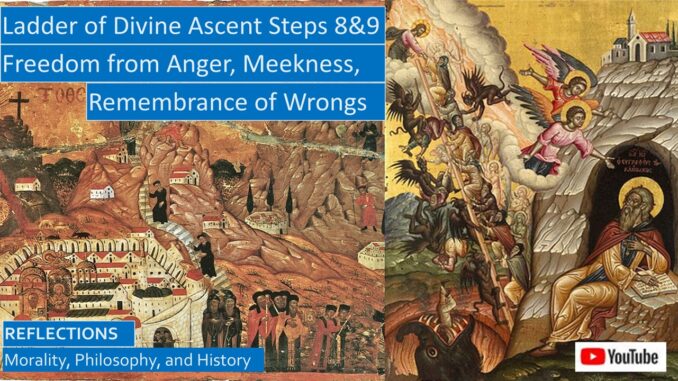
What can we learn as we reflect on climbing the eighth and ninth rungs on of the Ladder of Divine Ascent on Freedom From Anger, Meekness, and Remembrance of Wrongs?
Why is anger such a spiritually hazardous emotion?
Wasn’t Jesus angry when he overturned the tables of the money-changers in the temple?
Is meekness always weakness? What does it mean to be meek?
Does Jesus expect Christians to be walking carpets?
Why is the Remembrance of Wrongs so spiritually hazardous?
YouTube script, with Amazon book links:
https://www.slideshare.net/BruceStrom1/st-john-climacus-ladder-of-divine-ascent-freedom-from-anger-meekness-remembrance-of-wrongs-steps-8-9
YouTube video for this blog: https://youtu.be/2mEjh425sJk
PRECEDING RUNGS OF THE LADDER OF DIVINE ASCENT
St John Climacus wrote the Ladder of Divine Ascent as a handbook for monks living the monastic life, cut off from the world, in the isolation of the Egyptian desert monasteries, in a world before global communications where the monk could easily call his family on the monastery phone. In the first chapter he has some advice for the layman who wishes to live the perfect life as best he can in the world, but the advice for his fellow monks must be allegorized to apply it to our lives as laymen.
Each step of the Ladder of Divine Ascent builds on the prior steps, beginning with our Detachment and Exile from the values of this sinful world,
https://youtu.be/qDtrgYmaAQU
followed by the need for Obedience to the Law and the Gospel,
https://youtu.be/_bjQcNvzb-c
and how we should be persistent in our Repentance, which we compared to the Allies in fighting the Axis of Evil Fascism.
https://youtu.be/NiuWNsy4x4Q
The prior step of the Ladder was on Remembrance of Death and Joy-Making Mourning.
https://youtu.be/pFwC2nDf1CQ
STEP 8: ON FREEDOM FROM ANGER AND MEEKNESS
The eighth and ninth steps on the Ladder of Divine Ascent pairs two virtues:
Step 8: On freedom from anger and on meekness.
Step 9. On Remembrance of Wrongs.
St Paul in Ephesians exhorts us that though we can be angry at times, we should not sin. St Paul exhorts us to realize that being truthful to our neighbor and our very essence as Christians should lead us to control our anger and avoid anger whenever possible:
“Put off your old nature which belongs to your former manner of life and is corrupt through deceitful lusts, and be renewed in the spirit of your minds, and put on the new nature, created after the likeness of God in true righteousness and holiness.”
“Therefore, putting away falsehood, let everyone speak the truth with his neighbor, for we are members one of another. Be angry but do not sin; do not let the sun go down on your anger and give no opportunity to the devil.”[1]
St John Climacus teaches us,
Step 8.2. “Freedom from anger is victory over nature and insensibility to insults, acquired by struggles and sweat.”
WHAT DOES IT MEAN TO BE MEEK?
What does it mean to be meek? We hear the Beatitudes sing, “The meek shall inherit the earth,” we puzzle over the meaning of the word.
St John Climacus teaches us,
Step 8.3. “Meekness is an immovable state of soul which remains unaffected, whether in evil report or in good report, in dishonor or praise.”
We are also reviewing the commentaries by two Orthodox priests whose wisdom is increased by the many confessions they have heard as spiritual counselors for many years. They have much useful advice for those struggling with anger and the need to be meek.
Father Vasilios describes meekness: “We tend to think of meekness as a personality trait. When we hear the word meek, we usually think of someone softly spoken, easily pushed around who never raises his voice, maybe even someone who is weak. But meekness is not the same as weakness, nor is it a particular kind of personality. Meekness is a virtue.”
Father Vasilios continues: “Our Lord described himself as meek, yet he smashed up the markets outside the temple in Jerusalem, he denounced the Pharisees, Scribes and Sadducees as hypocrites and a brood of vipers, telling them they were going to hell. Jesus frequently rebuked his apostles and admonished the Israelites for their faithlessness.” “As Christians, we were we are called upon to take up Christ’s yoke and imitate his meekness. That does not mean we should be doormats,” or, in the words of Princess Leia, walking carpets.
Father Mack teaches us: “Those who are progressing on the road to meekness” must take as their first rule: ‘I will never speak in an angry tone of voice to anyone who speaks in anger to me. I will not answer back in kind,” plus “I will never allow myself to speak in anger to anyone. This is especially true when I give advice or counsel or rebuke to those who are under my authority” as a parent or teacher or boss.
As my “second rule, I will not allow my mind to think angry thoughts against those who speak in angry words to me.” Also, “I will not allow my mind to think angry thoughts against anyone.”
FREEDOM FROM ANGER
Father Mack asks, “Why do we become angry? Is it not because we are pursuing the perfect in this world? Is it not because we are busy building up our own kingdoms instead of the Kingdom of God? Is it not because we are concerned about how we appear and are treated in this world, rather than how we will appear and be treated in the world to come? Does not our anger most often have its source in our own exalted opinions of” “ourselves?”
Anger is when you build your house on sand, when the waves of life come and pound against the house, it does not stand, and great is its fall. But meekness is like the house built upon the rocks, that stands firm against the pounding of waves. Like the house on the rocks, meekness is not affected by the pounding of the waves of anger:
Step 8.5. “Wrath is a reminder of hidden hatred, that is to say, remembrance of wrongs. Wrath is a desire for the injury of the one who provoked you. Irascibility is the untimely blazing-up of the heart. Bitterness is a movement of displeasure seated in the soul.”
Have pity on those who refuse to control their anger, who are always bitter, angry, and resentful. All of us have a bad day, but when a hothead has a bad day, he has a really, really bad day.
St John Climacus teaches us,
Step 8.11. “An angry person is a willing epileptic, who due to an involuntary tendency keeps convulsing and falls down.”
When those who do not control their anger have a bad day, they may strike out at their wives, or their children, or may harm or even kill those they encounter. If St John Climacus were alive today, he would mention road rage, how it is hazardous to curse at the other drivers although they do not hear us.
Saint John Climacus teaches us that “malice thrives in the deceptively meek and silent.” Father Vasilios elaborates that we so often judge meekness and patience by externals, “I have seen people remain calm in the face of abusiveness, and after I expressed my admiration for their patience, they confess the boiling rage that was within them, which in many cases lasted for days, weeks, months, or even years.”
Father Vasilios notes that St John Climacus may be warning us “against bottling up our anger. It is far better to lose one’s temper and let it out rather than appear forbearing patient and humble, while fuming with rage inside. Of course, it is better neither to lose our temper nor to allow anger to fester.”
Father Vasilios continues: “Sometimes, either inwardly or outwardly, we lash out at our critics because we fail to see the truth that is being pointed out to us. Only when we are humble are we able to see things as they really are. Moreover, we think we are superior to our critics, so that even we do admit the criticism is correct, our reaction is: Who are you to criticize me?”
The Cynic philosopher Antisthenes advises us to “pay attention to your enemies, for they are the first to notice your faults,” for you can learn from their criticisms.[2]
Greek Cynic Philosophers: https://wp.me/pachSU-p4
Father Vasilios speculates: “Imagine how life changing it would be to rejoice in what others think of as causes for sorrow and anger! To find joy in what otherwise is a cause of so much sin and misery! The holiest of people, even the Saints, are not those who are loved and honored by everyone. Even those blessed people have enemies; even these are hated. To be holy is to transform our response to hatred into love and joy. If all were saints, we would be living in a perfect world, for it would be a world in which sorrow is joy, in which absolutely everything, however bad, is a cause of thanksgiving and gladness.”
When someone is irrationally and obsessively angry at a neighbor, and they tell everyone they know their faults, and try to destroy them, they may be telling you more about themselves than they realize. Sometimes their anger is for a moral weakness they refuse to see in themselves. In other words, gaslighting.
Another interesting passage is when Jesus shows us how to be free of anger. Jesus is foretelling how he would be delivered up and condemned to death by the scribes and Pharisees, and what is the response of James and John, sons of Zebedee? They ask Jesus whether they will be seated at his side when He reigns in glory. But Jesus does not get angry, he simply answers the question, that it is not He but the Father who chooses who will be seated where. The other disciples become angry with them, though, but again Jesus has them lay aside their anger, explaining that as He came to serve and not to be served, so the greatest among them will be servants.[3]
A recurring theme is the Ladder of Divine Ascent is the climb is not a one-time conversion vaulting us to the top of the ladder, but is rather a process, a changing of habits, that we practice for the rest of our lives, ever climbing, until we reach the great IMAX theater in the sky with screens forty feet wide and forty feet tall that replays the major events in our lives at the end of days.
Step 8.23. “The beginning of blessed patience is to accept dishonor with sorrow and bitterness of soul. The middle stage is to be free from pain in the midst of these things. But perfection, if it is possible, is to regard dishonor as praise. Let the first rejoice; let the second be strong; blessed is the third, for he exults in the Lord.”
All sins are bound together, one sin leads to another. St John Climacus imagines what anger would say if it were to name its relatives:
Step 8.29. “My mothers are vainglory, love of money, greed, and sometimes lust. My father is called conceit. My daughters are remembrance of wrongs, enmity, self-justification, and hatred.” In this step, St John Climacus also urges: “Let the tyrant anger be bound with the chains of meekness, and be beaten by patience, and dragged out by holy love.”
The antithesis of anger is love, as St Paul writes in Corinthians 13:
Love is patient and kind;
Love is not jealous or boastful;
Love is not arrogant or rude.
Love does not insist on its own way;
Love is not irritable or resentful;
Love does not rejoice at wrong,
but rejoices in the right.
Love bears all things, believes all things,
hopes all things, endures all things.[4]
You must apply these teachings on meekness with common sense. After all, St John Climacus was writing for monks who did not have to worry about earning a living in a cold, cruel world. Christians living in the world have an obligation to earn a living for their family, and sometimes radical meekness will appear to be weakness, sometimes we have to defend ourselves and our reputations so we can be productive members of society.
There is another scenario where meekness shows weakness. Based on my experience as a facilitator in divorce support groups, Christian wives must not confuse weakness with meekness when their husband physically abuses them, or their children. You are compelled to assume that if your husband is capable of physically abusing you, he is capable of physically abusing your children. If you are in a physically abusive marriage, Jesus wants you and your children to be strong and to separate so you can live where you feel safe.
Difficult decisions must be made in difficult home situations. When applying the advice in this book in a family situation, when striving to lead a godly life, ask these simple questions:
First, and most important, what is best for our children?
Second, what is best for my spouse?
Compelling our spouse to earn a living and be responsible for their actions is often beneficial for their soul and self-confidence.
Lastly, what is best for my spirit?
There is a story in the Gospels where Jesus is angry, which always reminds me of one Sunday when I was young and visiting a Baptist men’s ministry meeting. This good old boy was launching into quite an impressive preaching on leading a godly life, and he started talking about anger, how you should never be angry, how anger always leads to sin, how anger always leads to bitterness.
When he paused for breath, I, being young and foolish, chirped up, “But Jesus certainly seemed to be quite angry when he drove the money changers from the Temple.” This remark quite rattled him, he lost his train of thought, and quite ruined the rehearsed cadence of his mini sermon.
Being good Baptists, they collected names and addresses and phone numbers of everyone attending, to be used on Tuesdays when good Baptists go visiting. I wasn’t visited, but that good old boy gave me a call later that week. “Well, I was really wondering about whether or not I should give you a call about last Sunday, and finally after praying about it a bit I decided I would. You see, I have been working with some of them boys in my group real close, encouraging them to let Jesus in their hearts and give up on their drinking and carousing, and your comments just weren’t much help. I was really thinking about asking you not to come back, but after praying about I got to figuring that that just wouldn’t be right. So, you are welcome to come back as long you sit in the back row and be quiet.”
You might say that I climbed up the ladder a rung or two that day. It is not enough to be right, we should be right and humble, we should sometimes practice silence, lest pride gets in our way, lest we are right in the wrong way.
STEP 9: ON REMEMBRANCE OF WRONGS
Although Christians who live in the world are not always able to live as radically meek a life as do monks of the isolated monasteries of the Egyptian desert, we are able to follow all the advice offered to us on the danger of remembering wrongs. Our two Orthodox priest commentators also have much useful advice on climbing this rung of the ladder.
Father Vasilios teaches us, “Even if we have not forgiven with our heart, we should at least humble ourselves and be the first to say sorry. Realizing our own hypocrisy, we may be moved to strive all the more to make our forgiveness sincere.”
Father Vasilios continues: “When we contemplate God, the only Good One, the only Holy One, the Almighty One who created all things, suffering on the cross and loving humility and saying, ‘Father, forgive them, for they know not what they do,’ how can we continue to bear a grudge? But all too often, we seek to justify our anger. I’ve heard people say, ‘But this person knows what he does!’ Do you think that would have made any difference? If the Pharisees, many of whom did know better, had repented and asked Christ to forgive them from the foot of the cross, would our Lord have refused?”
Father Vasilios continues: “While we must always be compassionate to human weakness and not condemn Christians for being nothing more than human, we should, at the very least, learn to ask God to help us and have pity on us for being unforgiving. That would be a start! Alas, too many of us refuse even to admit that we should forgive, and we fail to see how hypocritical we are for not doing so. Thus, we turn Christ’s commandment to forgive into a naïve platitude rather than a very real and stern commandment by which we shall all be judged. Thus, let us pray to the Lord, ‘Lord, I believe I should forgive, help me to really forgive!” Which is a paraphrasing of Mark 9:24.
Humility quenches anger:
Step 9.6. “As with the appearance of light, darkness retreats; so at the fragrance of humility, all anger and bitterness vanishes.”
In yet another passage meekness and anger are contrasted:
Step 9.13. “It is a mark of extreme meekness, even in the presence of one’s offender, to be peacefully and lovingly disposed towards him in one’s heart, then it is certainly a mark of hot temper when a person continues to quarrel and rage against his offender, both by words and gestures, even when by himself.”
This last passage causes me pain, it reminds me of the many broken relationships I have witnessed, where faults of the ex-spouse are sought out, where animosity is kept alive, where both spouses bait the other. Sometimes, as a divorce support facilitator, I see a gentle soul who is lovingly disposed towards an ex-spouse who has left, but that is rare. Dear Lord, may we be peacefully and lovingly disposed towards our spouse when they offend us, may we have a fond place for them in our heart, may we have pity and compassion for those closest to us. Dear Lord, may our temper not be hot, may we not quarrel or rage against our spouse, neither when we are together nor when we are apart. We pray we may not say harsh words about our spouse to others, especially not to our children.
The icons of the Ladder of Divine Ascent show demons dragging climbers off the ladder into the abyss of the darkened souls, and it is clear that demons pull off more sinners off the rung of remembrance of wrongs than any other:
Step 9.2. “Remembrance of wrongs is the consummation of anger, the keeper of sins, hatred of righteousness, ruin of virtues, poison of the soul, worm of the mind, shame of prayer, cessation of supplication, estrangement of love, a nail stuck in the soul, pleasureless feeling cherished in the sweetness of bitterness, continuous sin, unsleeping transgression, hourly malice.”
Father Vasilios warns us: “Devout Christians will often use the Scriptures, the Church Fathers, and examples from the lives of the saints to make their unhealed passion appear to be righteousness.”
But we should be wary of pulling verses out of Scripture without reading the surrounding verses with context, and interestingly, St John Climacus also cautions us of cherry-picking or proof-texting, not reading Scriptures to discern the truth but rather to justify our prejudices, which can easily lead to quoting Scriptures to justify our own sinful attitudes:
Step 9.10. “Remembrance of wrongs is an interpreter of Scripture which explains the words of the Spirit allegorically in order to suit its own disposition.”
Jimmy Carter remembers in his devotions how, in his youth, his deep-South Bible study group annually invited seminary professors to show how the Scriptures justified the Separate But Equal doctrine that made separation of blacks from whites the law of the land.[5]
So, the remembrance of wrongs is a nail stuck in your soul, poisoning your soul, festering malice hourly, ruining all virtues. Indeed, remembrance of wrongs is a keeper of sins, as the passages following the Lord’s prayer in Matthew makes clear:
“If you forgive men their trespasses, so will your Father in Heaven forgive you your trespasses.
But if you do not forgive men their trespasses, neither will your Father in Heaven forgive you your trespasses.”[6]
Jesus teaches that we are to be perfect just as our Father in Heaven is perfect, but not too many Christians worry about this passage, thinking they do not need to be perfect since they will be forgiven. But Jesus must mean we must be perfect in some manner, and perhaps we need to be perfect in forgiving others, that we cannot cherry pick whom we will forgive and whom we will not, whether we can forgive those we do not know too well but not those close to us who have hurt us deeply. Perhaps these teachings mean that we need to be perfect in forgiving others, everyone, whether they have hurt us or not, no exceptions.
Remembrance of wrongs is also the cessation of love. And remembrance of wrongs goes further than mere forgiveness, as we can see in this disturbing passage following the Beatitudes:
“So, if you are offering your gift at the altar, and there remember that your brother has something against you, leave your gift there before the altar and go; first be reconciled to your brother, and then come and offer your gift.”[7]
Love erases anger, and without anger forgiveness is possible:
Step 9.4. “He who has put a stop to anger has also destroyed remembrance of wrongs.”
Step 9.5. “He who has obtained love has banished revenge.”
Step 9.6. “A banquet of love dispels hatred.”
And remembrance of wrongs is the worm of the mind:
Step 9.15. “Worms grow in a rotten tree, and malice finds a place in falsely meek and silent people. He who has cast it out has found forgiveness, but he who clings to it is deprived of mercies.”
There are many who think they are Christians who insist on following Jesus on their own terms. They don’t mind forgiving most people, but they want to choose those whom they won’t forgive, those whose shortcomings they do not wish to forget.
We should all pray that we will forgive all sins and forget all wrongs so we can boldly ask our Savior Jesus to release us from our sins. John Climacus concludes:
Step 9.17. “The forgetting of wrongs is a sign of true repentance. But he who dwells on them and thinks that he is repenting is like a man who thinks he is running while he is really asleep.”
Step 9.19 “Let no one regard dark spite as a harmless passion, for it often manages to reach out even to spiritual men.”
We will conclude with an observation from Father Mack:
When “I begin to notice how many people treat me poorly and speak to me rudely,” “my list of offenses grow longer grows larger, I become more angry and more bitter,” “I love less and am less able to receive love.” “I become so embittered that I experience no love and I give no love. I’m alone in hell! The demons have me just where they want me to be.”[8]
FUTURE RUNGS OF THE LADDER
Ahead is the tenth, eleventh, and twelfth rung of the Ladder of Divine Ascent, On the dangers of Slander, Talkativeness, and Lying. And Yes, slander is distinguished from lying, although they are cousins.
DISCUSSING THE SOURCES
Both of these editions of the Ladder of Divine Ascent use the same translation, but each has its own thoughtful introductions, the introduction in the Classics of Western Spirituality is by Bishop Kallistos Ware. We find this work as easy to read as the works of the Stoic Philosophers that influenced Christianity and the monastic tradition, but we also have the commentaries by Father John Mack and Father Vassilios Papavassiliou, which are valuable because they reflect their experience as priests hearing confessions.
[1] https://www.biblegateway.com/passage/?search=ephesians+4%3A22-27&version=RSVCE
[2] Diogenes of Laertius, Lives of Eminent Philosophers, translated by Pamela Mensch, (New York: Oxford University Press, 2018), Book on the Cynic Philosophers, Book 6, C: 103-105, pp. 308-309.
[3] https://www.biblegateway.com/passage/?search=mark+10%3A35-45&version=RSVCE
[4] https://www.biblegateway.com/passage/?search=1+Corinthians+13%3A4-7&version=RSVCE
[5] Jimmy Carter, Through the Year With Jimmy Carter, 366 Daily Devotions from the 39th President (Grand Rapids, Michigan, Zondervan , 2011), Day 204.
[6] https://www.biblegateway.com/passage/?search=matthew+6%3A14-15&version=RSVCE
[7] https://www.biblegateway.com/passage/?search=Matthew+5%3A23-24&version=RSVCE
[8] St John Climacus, Ladder of Divine Ascent (Boston: Holy Transfiguration Monastery, 1991, originally written 1100’s, translated by Colm Luibheid and Norman Russell), Steps 8 and 9, pp. 91-89; and Father John Mack, Ascending the Heights, Laymen’s Guide to the Ladder of Divine Ascent (Ben Lamond, California: Conciliar Press, 1999), Steps 8 and 9, pp. 45-52; and Father Vassilios Papavassiliou, Thirty Steps to Heaven, The Ladder of Divine Ascent for All Walks of Life (Chesterton, Indiana: Ancient Faith Publishing, 2103), Steps 8 and 9, pp. 62-85.

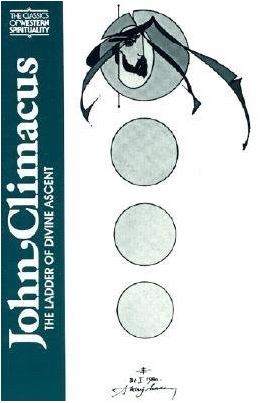

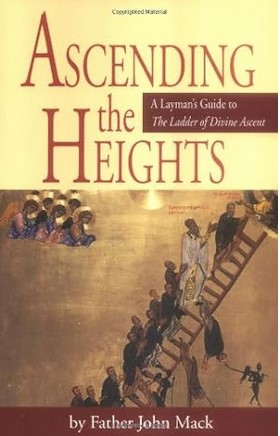
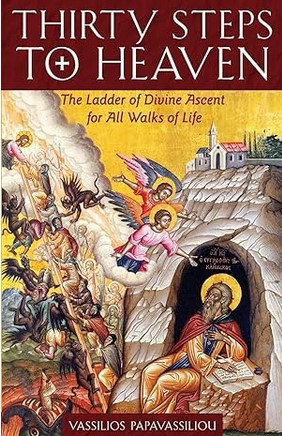
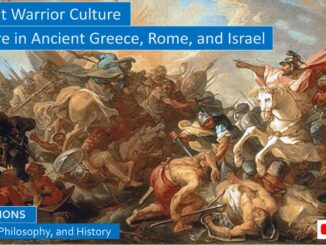

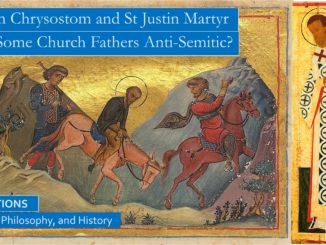
2 Trackbacks / Pingbacks